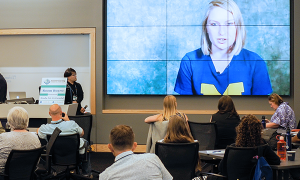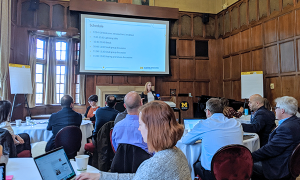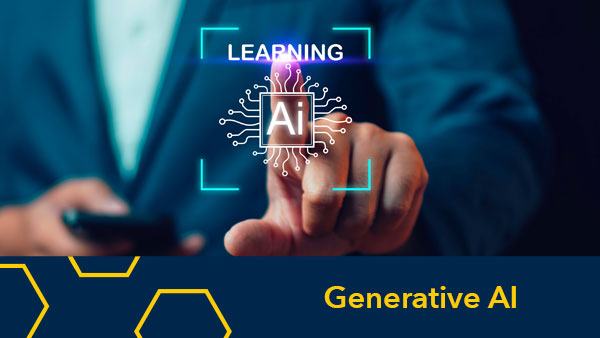Ryan Henyard, Faculty Experience Designer
From developing software tools that support classroom pedagogies to creating online courses and degree programs, the Center for Academic Innovation collaborates with faculty and staff from across the entirety of the University of Michigan to build and support a culture of innovation at our institution. One of the ways Academic Innovation serves this community of innovators is through the development and support of various communities that bring those voices together around our shared interest in transforming education. To aid in this endeavor, we formed groups that we’ve called Academic Innovation at Michigan (AIM) Communities.
 There are a number of different types of communities under the AIM Community umbrella, and their forms and structures have often evolved over time to meet the needs of their particular communities. This fall, we will reboot the “Simulations Community of Practice” to focus more deeply on role-playing simulations. In winter 2020, the “Gameful Learning Community” will relaunch and bring together instructors from across campus to advance the use of gameful pedagogy in residential courses. The “Online and Hybrid Programs community” has a set of smaller affinity groups for degree program leaders and support staff, as well as larger gatherings for the entire community for discussions on overarching challenges.
There are a number of different types of communities under the AIM Community umbrella, and their forms and structures have often evolved over time to meet the needs of their particular communities. This fall, we will reboot the “Simulations Community of Practice” to focus more deeply on role-playing simulations. In winter 2020, the “Gameful Learning Community” will relaunch and bring together instructors from across campus to advance the use of gameful pedagogy in residential courses. The “Online and Hybrid Programs community” has a set of smaller affinity groups for degree program leaders and support staff, as well as larger gatherings for the entire community for discussions on overarching challenges.
Communities of Practice, Learning Communities, and Affinity Groups
Originally introduced by social anthropologist Jean Lave, PhD, Professor Emerita in the Department of Geography at the University of California, Berkeley, and educational theorist Etienne Wenger-Trayner, the community of practice concept is functionally just a new name for a phenomenon that has occurred throughout human history: the tendency of those who share some sort of specialized knowledge or context building, sharing and reflecting on their collective knowledge. In addition to Communities of Practice, there are learning communities of those looking to develop their skills together in groups and cohorts, and affinity groups built around the challenges of specific job roles.
No matter how they are technically classified, the goals of our involvement in these AIM Communities are consistent:
- To provide space and opportunities for social learning amongst our dynamic group of campus partners.
- To support faculty and staff who are entering the innovation space, whether they come as explorers looking for exposure to some of the innovative work on campus; as creators of new tools, courses, or other products; or as adopters looking to integrate online content or a tool into their teaching.
- To accelerate the growth of the academic innovation network across campus by helping to generate genuine connections between innovators.
- To inform the development and utilization of the tools, resources and services provided by Academic Innovation.
 Becoming an innovator is, by definition, choosing to do things differently than they have been done in the past. It’s pretty common to feel isolated when doing something new in your department or unit; what has often made that navigable for me is spending time in the presence of fellow travelers. There is little substitute for building connections with others who have served as trailblazers in their own right or learning how to avoid potential pitfalls from peers in other parts of the university. Although Michigan’s decentralized nature often leads to a myriad of ways things get done on campus, I truly believe the spirit of collegiality we have when working together is one of our defining traits as an institution. Supporting the growth of these networks and communities can result in better experiences for our learners, but also builds a healthier, more collaborative experience for our faculty and staff.
Becoming an innovator is, by definition, choosing to do things differently than they have been done in the past. It’s pretty common to feel isolated when doing something new in your department or unit; what has often made that navigable for me is spending time in the presence of fellow travelers. There is little substitute for building connections with others who have served as trailblazers in their own right or learning how to avoid potential pitfalls from peers in other parts of the university. Although Michigan’s decentralized nature often leads to a myriad of ways things get done on campus, I truly believe the spirit of collegiality we have when working together is one of our defining traits as an institution. Supporting the growth of these networks and communities can result in better experiences for our learners, but also builds a healthier, more collaborative experience for our faculty and staff.
The success of our efforts to create a more equitable, inclusive, and effective higher education experience for learners is predicated on the collaboration and support of our inspiring faculty and staff colleagues. By organizing and convening these community conversations, we hope to provide an igniting spark for transformative change. If you are interested in joining us on this journey, I invite you to learn more about AIM Communities. I’m extremely excited to see where this upcoming academic year takes us, and look forward to making new connections along the way; if you have an idea for a new learning community that aligns with our work, let us know!


